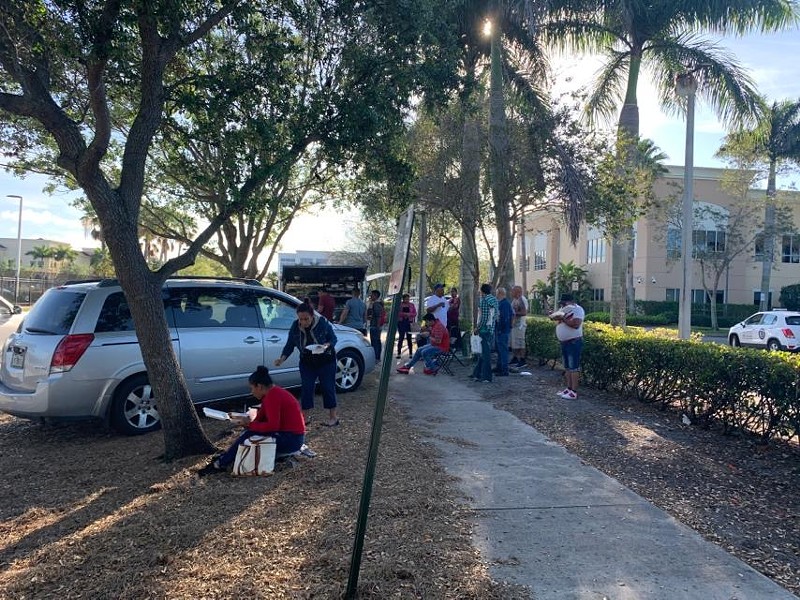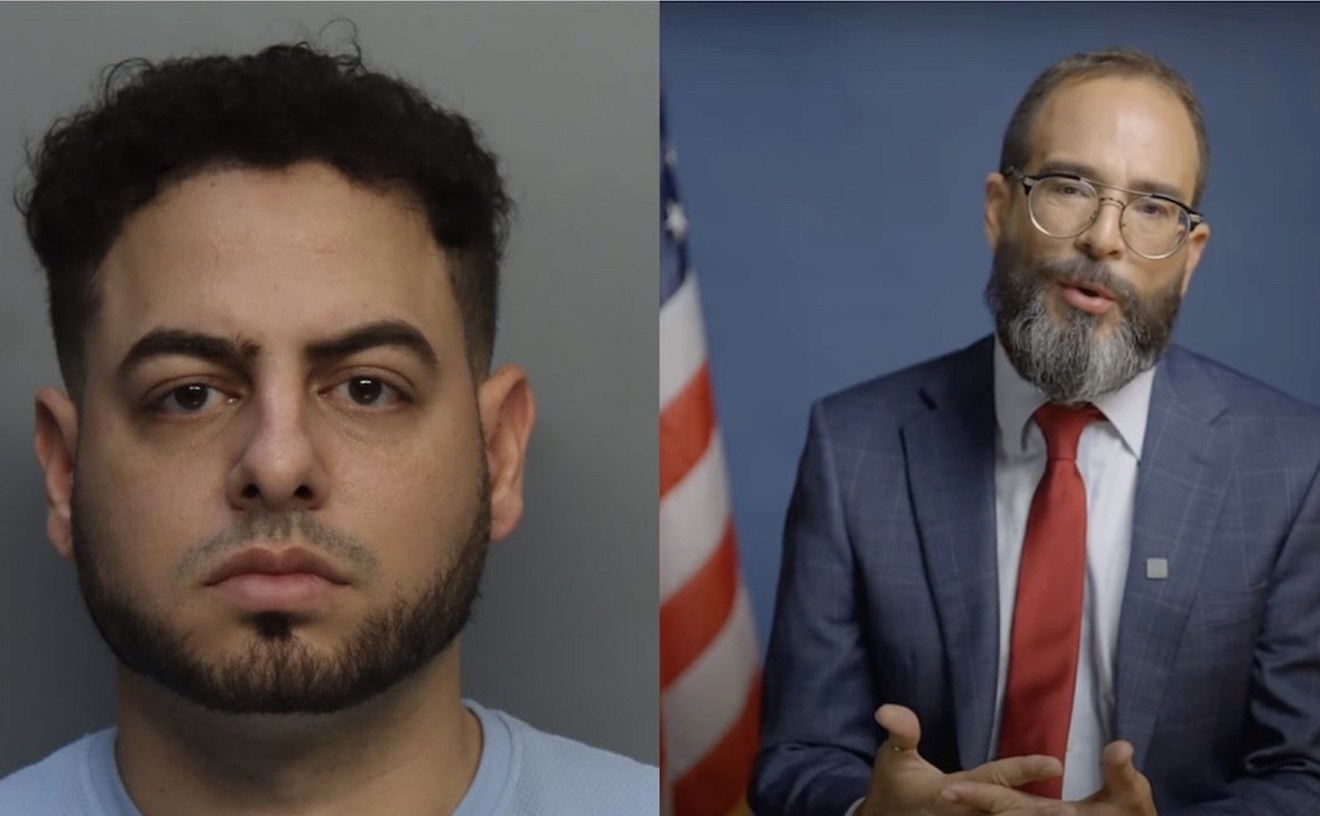The outbreak of the novel coronavirus has fundamentally changed daily life in South Florida, where large gatherings have been canceled. Public health experts recommend working from home and avoiding public transportation, if possible, to stem the spread of COVID-19. All of those precautions, however, appear to go out the window when it comes to immigrants, who, with few exceptions, must still report to the Immigration and Customs Enforcement (ICE) facility in Broward County.
Immigrant-rights groups have been banging the drum since the beginning of the coronavirus crisis by pressuring ICE to suspend all physical check-ins and release as many migrant detainees as possible from detention centers. This past Friday, a group of activists held a press conference in front of the Broward County ICE office in Miramar, where hundreds of immigrants line up daily to meet with federal officials for in-person meetings. Many of those waiting in line are elderly — a group identified by the Centers for Disease Control and Prevention (CDC) as high-risk for COVID-19 deaths.
Afraid of coronavirus but even more frightened of deportation, those immigrants are forced to disregard CDC recommendations when they take public transportation and stand in long lines for hours without access to facilities where they can wash their hands.
The Miramar facility's decision to remain open is out of step with not only the CDC's recommendations but also other ICE offices in Florida. This morning, an ICE official informed attorneys that the agency's Orlando office would suspend most of its operations for the time being, according to Adonia Simpson, director of the Family Defense Program. The Orlando office will still accept filings from attorneys representing immigrants but will no longer hold physical check-ins.
Additionally, according to anecdotal reports received by members of the American Immigration Lawyers Association, the ICE office in Tampa also is in the process of closing down most operations, though the office hasn't formerly confirmed its closure.
"The only place in the region we haven't heard from is Miramar," Simpson says. "We're getting mixed messages. Local and state governments have advised against these kinds of large gatherings, and then we have ICE requiring people to check in."
In a message sent to Miami Herald reporter Monique Madan this past Saturday, an official said the agency would not pause check-ins but would allow immigrants to call to reschedule their hearings. ICE echoed that same message in an email to New Times today.
"U.S. Immigration and Customs Enforcement (ICE) Miami is working to minimize the impact of COVID-19 by temporarily rescheduling and reducing in-person appointments of non-detained aliens on a case-by-case basis," the agency wrote. "Any person with an upcoming appointment who is ill, or had close contact with someone who is ill, should contact the Miami Enforcement and Removal Operations (ERO) field office prior to their scheduled appointment for further guidance."
Americans for Immigrant Justice has been working to get the word out about the rescheduling option, but Simpson says many immigrants still don't know they're allowed to postpone their check-ins. Moreover, a call or email to reschedule might not be enough: Reports that Simpson and others have received indicate that many rescheduling requests have gone unanswered or unapproved.
A massive line of immigrants outside the Miramar facility this morning suggests the check-ins are proceeding as usual.
"It was as packed as ever, as if the crisis weren't happening. The parking lot was full," says Maria Bilbao, an organizer with the immigration advocacy group United We Dream. "There are elderly people and mothers with their children. ICE is putting them all at risk for no reason."
Public health advocates have been concerned that the Trump administration's aggressive immigration enforcement policies could lead undocumented people to avoid seeking coronavirus testing for fear of deportation. ICE itself has maintained that it does not conduct arrests in hospitals "except under extraordinary circumstances." But that reassurance likely means little to immigrants who have been told time and again by Trump officials that they should not feel safe or secure in the United States.
In addition to fearing deportation, undocumented immigrants lack access to government-provided healthcare programs such as Medicaid and Medicare. Prohibitive costs for coronavirus testing could lead many uninsured immigrants to avoid seeking medical attention, potentially allowing infected individuals to unintentionally spread the virus.
"I can tell you because I spent 17 years undocumented myself," Bilbao says. "When you're undocumented, going to the emergency room is your absolute last resort no matter how sick you may be."

Audio By Carbonatix
[
{
"name": "Air - MediumRectangle - Inline Content - Mobile Display Size",
"component": "19274298",
"insertPoint": "2",
"requiredCountToDisplay": "2",
"watchElement": ".fdn-content-body",
"astAdList": [
{
"adType": "rectangle",
"displayTargets": "mobile"
}
]
},{
"name": "Editor Picks",
"component": "17482312",
"insertPoint": "4",
"requiredCountToDisplay": "1",
"watchElement": ".fdn-content-body",
"astAdList": [
{
"adType": "rectangleLeft",
"displayTargets": "desktop|tablet"
},{
"adType": "rectangleRight",
"displayTargets": "desktop|tablet|mobile"
}
]
},{
"name": "Inline Links",
"component": "18711090",
"insertPoint": "8th",
"startingPoint": 8,
"requiredCountToDisplay": "7",
"maxInsertions": 25
},{
"name": "Air - MediumRectangle - Combo - Inline Content",
"component": "17482310",
"insertPoint": "8th",
"startingPoint": 8,
"requiredCountToDisplay": "7",
"maxInsertions": 25,
"watchElement": ".fdn-content-body",
"astAdList": [
{
"adType": "rectangleLeft",
"displayTargets": "desktop|tablet"
},{
"adType": "rectangleRight",
"displayTargets": "desktop|tablet|mobile"
}
]
},{
"name": "Inline Links",
"component": "18711090",
"insertPoint": "8th",
"startingPoint": 12,
"requiredCountToDisplay": "11",
"maxInsertions": 25
},{
"name": "Air - Leaderboard Tower - Combo - Inline Content",
"component": "17482313",
"insertPoint": "8th",
"startingPoint": 12,
"requiredCountToDisplay": "12",
"maxInsertions": 25,
"watchElement": ".fdn-content-body",
"astAdList": [
{
"adType": "leaderboardInlineContent",
"displayTargets": "desktop|tablet"
},{
"adType": "tower",
"displayTargets": "mobile"
}
]
}
]













